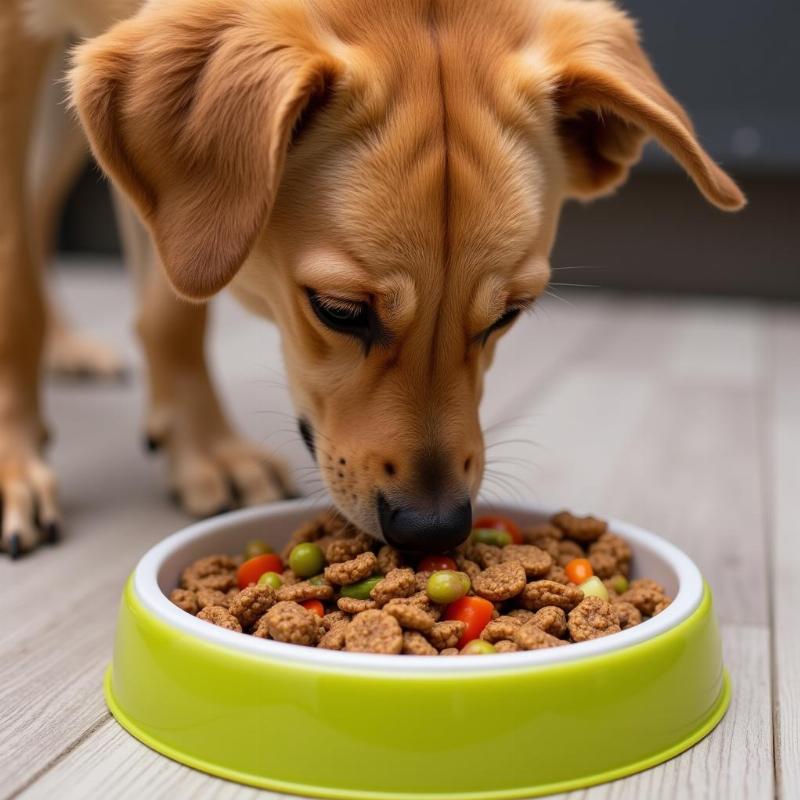Cataracts in dogs can be a worrying diagnosis for any pet owner. You might be searching for natural remedies and stumble upon castor oil as a potential treatment. This article will delve into the truth about castor oil for cataracts in dogs, exploring the scientific evidence, potential risks, and safer alternatives for managing this eye condition in your furry friend. Understanding the facts surrounding this home remedy is crucial for making informed decisions about your dog’s eye health.
Understanding Canine Cataracts
Cataracts cloud the lens of the eye, impacting vision and potentially leading to blindness. They can develop due to aging, genetics, diabetes, trauma, or other underlying health issues. Symptoms include a cloudy or bluish appearance to the eye, difficulty navigating, and changes in behavior. If you suspect your dog has cataracts, a visit to a qualified veterinarian is essential for accurate diagnosis and treatment options.
Debunking the Castor Oil Myth
While some online sources claim castor oil can dissolve or improve cataracts in dogs, there is no scientific evidence to support these claims. In fact, using castor oil in your dog’s eyes can be harmful. It can cause irritation, inflammation, and potentially introduce infections. The eye is a delicate organ, and applying any unprescribed substance can lead to complications. Always consult with your veterinarian before using any home remedies, especially on sensitive areas like the eyes.
Safe and Effective Cataract Treatments for Dogs
Fortunately, there are proven and safe treatment options for cataracts in dogs. Surgery is the most effective way to remove cataracts and restore vision. During surgery, the clouded lens is removed and replaced with an artificial lens. While surgery carries some risks, it generally has a high success rate and significantly improves a dog’s quality of life. Non-surgical options, such as eye drops and medications, can manage symptoms and slow cataract progression in some cases. Your veterinarian will recommend the best course of action based on your dog’s specific needs and the severity of the cataracts.
Can Diet Impact Cataract Development in Dogs?
While genetics and age play a significant role in cataract development, a healthy diet can contribute to overall eye health. Antioxidant-rich foods, such as blueberries and carrots, can help protect against oxidative stress, which can damage eye cells. Ensuring your dog receives a balanced diet with adequate vitamins and minerals is crucial for their overall well-being, including eye health. Talk to your vet about the best diet for your dog’s specific needs, especially if they are predisposed to eye conditions.
 A dog enjoying a bowl of healthy dog food
A dog enjoying a bowl of healthy dog food
Conclusion
Castor oil is not a safe or effective treatment for cataracts in dogs. Relying on unproven remedies can delay proper veterinary care and potentially harm your pet. If you suspect your dog has cataracts, consult your veterinarian immediately for accurate diagnosis and treatment options. Surgical and non-surgical interventions can significantly improve your dog’s vision and quality of life.
FAQ
- Can cataracts be reversed in dogs? No, cataracts cannot be reversed, but they can be removed surgically.
- How much does cataract surgery cost for dogs? The cost varies depending on the veterinarian and location, but it generally ranges from $2,500 to $4,000 per eye.
- What are the signs of cataracts in dogs? Signs include a cloudy or bluish eye, difficulty seeing, bumping into objects, and changes in behavior.
- Is cataract surgery painful for dogs? While the procedure itself is performed under general anesthesia, there can be some discomfort during recovery, which is managed with pain medication.
- How long does it take for a dog to recover from cataract surgery? Most dogs recover within a few weeks, with significant vision improvement noticeable within days.
- Are certain dog breeds more prone to cataracts? Yes, some breeds, such as Cocker Spaniels, Poodles, and Siberian Huskies, are genetically predisposed to cataracts.
- Can I prevent cataracts in my dog? While not all cataracts are preventable, maintaining a healthy diet, managing underlying health conditions like diabetes, and regular veterinary check-ups can help minimize the risk.
Beautdogs.us is your leading source for comprehensive dog care information, breed insights, and product recommendations. We offer expert guidance for both new and experienced dog owners, ensuring your furry companion receives the best possible care. Contact us for personalized advice and resources. Email: [email protected] Phone: +1 501-555-7529. Beautdogs.us is your trusted partner in all things dog-related.